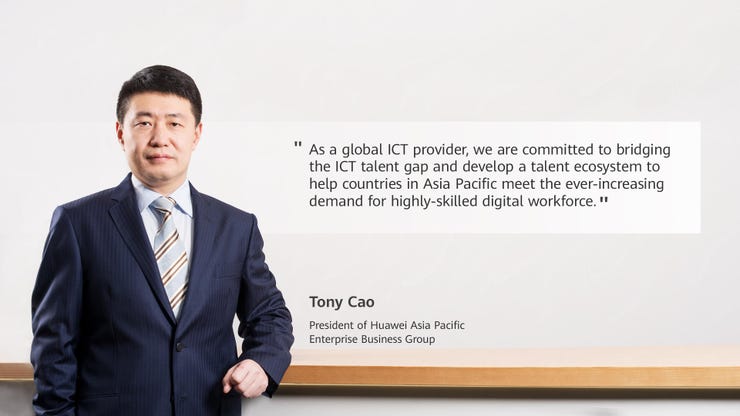Huawei tackles Asia Pacific’s shortage in high-quality digital workforce through ICT talent ecosystem development
By Tony Cao, president of Huawei Asia Pacific, Enterprise Business Group.
Despite a booming labour market, the Asia Pacific is currently faced with a digital workforce shortage. If not effectively addressed, a potential talent deficit in the region could hinder business development across industries.

As a global ICT provider, Huawei is committed to bridging the ICT talent gap. This is why we announced the long-term plan to develop a talent ecosystem to help countries in Asia Pacific meet the ever-increasing demand for highly-skilled digital workforce.
Leveraging decades of experience and expertise, Huawei has plans to tackle ICT workforce challenges in APAC through three programs: Certification system and standards; Huawei ICT Academy; and Huawei ICT competition.
To drive digital transformation, enterprises hunt for talent with both powerful brains and practical skills. Through the talent ecosystem strategy, Huawei is aiming to train a large number of professionals in advanced network technologies and set global talent standards that can be used as proof of professional qualifications.
Huawei Certification provides an ICT development standard and a complete architecture for certification that covers 11 ICT technical fields. Over the years, Huawei has certified more than 260,000 ICT professionals worldwide, including 19,000 in the Asia-Pacific. These industry-recognised certifications help students and ICT practitioners become more competitive in their careers, the company said.
Huawei firmly believes that a successful talent ecosystem development depends on extensive university-enterprise cooperation and a well-thought-out talent cultivation model. In 2013, Huawei launched the ICT Academy, a school-enterprise cooperation project that involves higher education institutions and industry-leading enterprises.
Over the past seven years, the program has been helping universities cultivate ICT talent that meet industry requirements though ICT courses and hands-on training.
Huawei's Academy also introduces Huawei's ICT technologies to students and encourages them to participate in Huawei certification that will give their career a big boost.
To date, Huawei ICT Academy has been deployed in 72 countries around the world, including 103 ICT Academy in the Asia-Pacific region.
In order to improve self-learning and problem-solving abilities, Huawei's international ICT competition aims to facilitate students with increasing their knowledge, meeting new people, and boosting their confidence. Through cooperation with governments, enterprises, and universities, Huawei held the first annual Huawei ICT Competition in 2015 for college students worldwide. The last competition in 2019 was held across 61 countries, which involved more than 100,000 students from more than 1,600 universities and colleges, including 7,200 students from the Asia-Pacific region.
Under the digital inclusion initiative, TECH4ALL, Huawei wants to globally develop 2 million ICT professionals over the next five years to match industry's growing demand for skilled workers.
Huawei plans to cooperate with partners and universities to actively invest in digital talent development, help countries in the Asia-Pacific region build an ICT talent ecosystem, and build a fully connected and intelligent world.